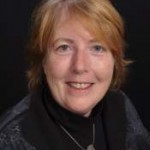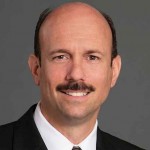Nancy Lundebjerg, MPA
Chief Executive Officer
American Geriatrics Society
Bruce A. Chernof, MD, FACP
President & Chief Executive Officer
The SCAN Foundation
Are YOU at the center of your own health and care? It may seem like an obvious question, but it’s an important one to consider since our medical system has often focused on treating illnesses rather than caring for people with illnesses.
That’s because the medical system usually measures success as decreasing the negative effects of disease. That’s an important aim, but ask any person what “well-being” looks like and they’re likely to talk more about being able to live well in spite of disease. This divide can be especially difficult to navigate for older adults with complex health problems: owing to the status of their health, older people may feel like they have a limited say in how they are treated by a network of primary care providers and specialists, with various family members and caregivers expressing their own points of view, too.
How do we better connect to people when it comes to elder health and care? A group of experts recently convened by the American Geriatrics Society (AGS) with support from The SCAN Foundation has taken steps toward answering that question by helping to define an innovative approach to health care: person-centered care.
Based on a broad review of existing research, as well as findings from interviews with health and social service organization leaders, the expert panel defined person-centered care as “care in which individuals’ values and preferences are elicited and, once expressed, guide all aspects of their health care, supporting their realistic health and life goals.”
A person-centered care approach starts with gathering information about the values and preferences of a person in light of health status, with input from family or others important to the person when desired. When reviewed along with a traditional health assessment by a healthcare provider, this person-centered information is used to help shape and articulate specific goals based on what an older person wants and needs from care. Rather than being driven only by clinical outcomes, these goals are directed by how a person wants to function and what he or she hopes to accomplish when thinking about future well-being.
So what can you do to make health and care more person-centered? Well, the group of experts brought together by the AGS identified several “essential” elements of person-centered approaches to health care. While no two experiences of person-centered care will be the same (they are, after all, person-centered!), recognizing when and how you can discuss the following with your healthcare providers is an important step toward ensuring you’re at the center of your own well-being:
- An individualized, goal-oriented care plan based on your own expressed preferences.
- An ongoing review of your goals and care plan (including opportunities to reassess the plan regularly to address health status changes over time).
- Care supported by a team of healthcare providers with different kinds of expertise, and with you as a key member of the team.
- One primary contact on the healthcare team who is responsible for communicating information and coordinating care with you and all the other team members.
- Continual information sharing and communication between you, family, and all healthcare and supportive service providers.
- Education and training about person-centered care for providers and, when appropriate, for you and your caregivers.
The Health in Aging Foundation has some great resources to help you learn more about the importance of person-centered care. You can read about the expert panel’s research in one of the Foundation’s latest research summaries available here, and you can even use this quick-reference guide as a conversation starter between you and your healthcare providers. Want even more information? Check out materials from the AGS and The SCAN Foundation, too!
# # #
Nancy Lundebjerg, MPA, is CEO of the American Geriatrics Society
Bruce Chernof, MD, is president and CEO of The SCAN Foundation


